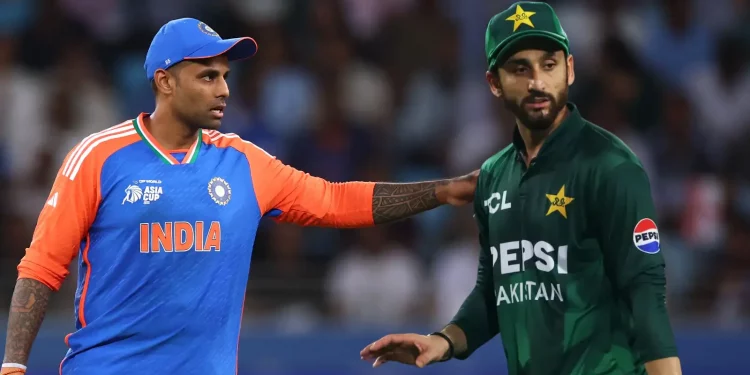The recovery of India was the opposite story. The rhythm was altered by Dube’s two wickets in 11 balls during the drinks interval.
Perhaps Sahibzada Farhan’s dismissal was the best way to sum up the evening. Only two hitters have ever scored more runs against him in Twenty20 Internationals. He was well established, past his half-century, and had already faced Jasprit Bumrah with uncommon success. At the midway point, Pakistan was ahead 90/2.
Then the time arrived. Shivam Dube forced Farhan to stretch out with his wide line after striking the surface with the slower ball he has been practicing with Morne Morkel. He was caught at cover as the shot went awry and the bat flew out of his hands.
First, the intention of Pakistan. After losing 127/9 in the last encounter, they responded by saying, “Swish hard, play brave, push India.” Before India won a near-miss for caught-behind, Fakhar Zaman also made a strong comeback. With 21 off 17, Saim Ayub broke out of his zeroes rut. To maintain the left-right combination, Hussain Talat was promoted. Additionally, Salman Ali Agha was relegated after averaging four against spin in this Asia Cup. Pakistan was determined to attack, and for ten overs, it was successful.
For India, the evening wasn’t ideal. Not even close. For the first time in three years, they failed to make four catches in a T20I. Kuldeep Yadav and Shubman Gill each put down one, while Abhishek Sharma threw down two, both of which were easy. Bumrah let up 45 runs in his four overs and was left without a wicket. Not helped by the drops from his bowling, Varun Chakaravarthy, who frequently chokeholds, also went wicketless for the first time in 12 T20Is.
India kept Pakistan trying till they made mistakes by bowling it slower and wider.
Nevertheless, Pakistan’s 171 felt about average, not exceptional. The gap is that. Others filled the gaps even after India’s finest were neutralised. Axar Patel, who hardly bowled during warm-ups and arrived with a neck patch after injuring himself fielding in Abu Dhabi, ended up bowling just one over. It was not even necessary for Hardik Pandya to bowl four overs. On a significantly flatter surface than the last time, Dube, who has only bowled out his whole allotment of overs three times in 39 Twenty20 Internationals, came through with figures of 2 for 33, with the majority of his deliveries hitting the back of the length.
“I think that Shivam Dube’s spell was a game-changer,” Suryakumar Yadav stated.
“I believe he has been putting a lot of effort into improving his bowling throughout every practice session. And he had the right opportunity at the right game. He always desired to bowl at least two overs, and today he was able to complete his allotted number of overs. He was therefore overjoyed. And based on his delivery, I believe he had very specific plans. And it makes my work easy since that’s what I want from the boys.”
In the chase, the gap appeared even more pronounced. Friends since their under-12 years, Shubman Gill and Abhishek Sharma, debuted with a stand valued at 105. The connection that converted the match into a canter wasn’t their first hundred together, and it won’t be their last. Gill even reverse-swept and threaded cover-drives. Once more, Abhishek hit the first ball out for a six.
Gill and Abhishek had plenty of shots and words, while Shaheen Afridi and Haris Rauf had both. The message for Pakistan was clear by the time the stand was broken.
Saying of Abhishek and Gill, “Both of them batted beautifully,” Suryakumar stated. “They provided the excellent start that was necessary for today.
“It’s like fire and ice together the way they both bat. What I want to see is that they work incredibly well together. When one bats exceptionally well, the other batsman might take a backseat and just rotate the strike.
“Off the pitch, I believe it’s crucial to have incredibly close friendships. It truly helps to strengthen your relationship if you are opening and batting together. On the pitch, you don’t always need to speak. You grab that cheeky single and stare them in the eye. I believe that when they bat together, friendship enters the scene.
This was the tournament’s greatest batting day for Pakistan. It was the tournament’s poorest bowling and fielding day for India. However, the competition did not continue. Even with its flaws, India was still too strong for Pakistan.







